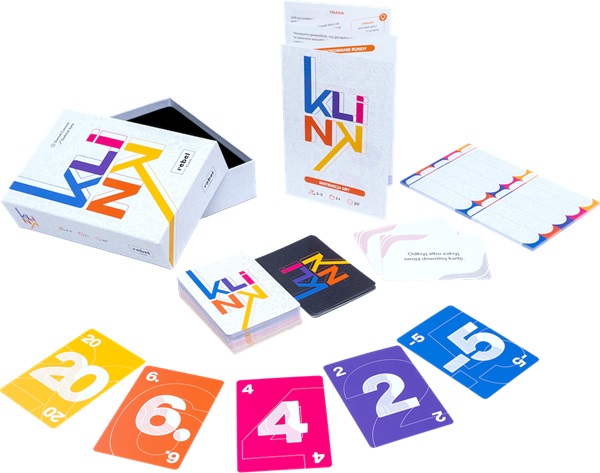Keep the Cards or Keep them Moving in Light Card Game Klink

Draw two cards, look at one, and decide whether to keep them both or pass them to another player. Klink is a card game of trying to avoid points and lucky guesses!
Published by Rebel Studio, Klink is a light card game for 2-5 players that plays in about 20 minutes.
Gameplay
The number cards are shuffled and set in the middle of the table. They range from -5 to 20. The special ability cards are also shuffled and set in the table, and three are drawn and placed face-up into a display.
On a player’s turn, he draws two numbered cards, keeping them face-down. He chooses one of them to look at and then decides to either keep both, flipping them face-up and adding them to his collection, or pass them to another player. If he passes them, the next player then chooses to look at one of the two cards and makes the same decision. The cards keep getting passed around the table until someone chooses to keep them or everyone else has already passed them, in which case the last player to receive them must choose to keep them.
When cards are kept and added to a player’s collection, he checks to see if any of the new cards form a triad with any cards already in his collection. A triad is a run of three consecutive numbers. When a player creates a triad, he takes one of the special ability cards in the display and performs the action on it. This might be giving a card to another player or flipping a card face-up or face-down. A new ability card is then drawn to refill the display. A player can only use one triad per turn.
After checking for triads, the player checks to see if he has two cards with the same numbers on them. If he does, he flips them face-down. The player who kept the cards now starts the next turn.
The round ends once someone has 10 or more cards. Players count up the values of all the cards in their collections, with face-down cards being worth zero points. The player with the lowest number adds 10 to his total and the player with the highest number takes away 10. Players then add the final numbers to their points. The goal of the game is to have the fewest points, and the game ends once one player reaches 77 points.

Review
Klink has a lot of interesting elements mixed in with its light, casual gameplay. Players might take high cards to push for a triad, or to complete a pair. If someone passes you the cards, do you want to look at the same one they already did, knowing it’s probably a high one or they wouldn’t have passed it? Or do you want to take a chance on the other card that hasn’t been looked at yet?
The special abilities come in a nice variety that allows players to manipulate the state of the game in different ways depending on if they’re already doing well that hand or falling behind. Also, adjusting the lowest and highest scores by 10 points each round is a good balancing mechanic while also adding another layer to gameplay, as a player might not actually want to score the least points, depending on how close his score is to the other players' scores for that round.
There is a good bit of take-that in the game, as players pass on bad cards or use the special abilities to ruin someone’s round. If everyone has already passed on a pair of cards, the last player to get them must take them, so it is also possible to gang up on the leader.
The cards themselves could be of better quality, but we liked the inclusion of a score pad, and the rules are well presented.
Klink is a solid and enjoyable light card game, with an interesting scoring system. If you like a bit of take-that, with a little bit of luck (as there’s always an element of uncertainty when you choose to keep cards), Klink is quite nicely put together mechanically.
Pros: Interesting scoring, range of ability cards, element of uncertainty when choosing to keep or pass cards
Cons: May be too much take-that for some players, the cards could be of a nicer quality
Disclosure: we received a complimentary review copy of this game.







